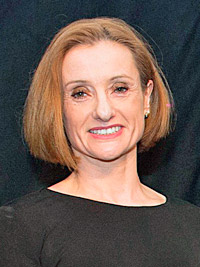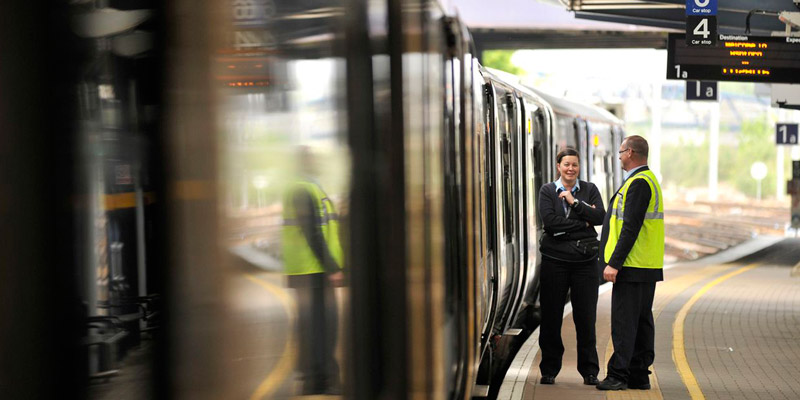Adeline Ginn is founder of Women in Rail, alongside her full time role as General Counsel at Angel Trains Limited. Set up by Adeline in 2012, Women in Rail is an organisation that aims to improve gender balance across the railway industry. It provides networking opportunities and support for all women working within the railway sector (including a mentoring programme) and devises initiatives aimed at promoting rail as an attractive career choice; engaging the younger generations to consider a career in the rail industry; influencing key stakeholders to support the business case for improving gender balance and bridging the skills gap in the railway sector.

On 17th November 2015,Women in Rail held its annual conference at Berwin Leighton Paisner Solicitor’s offices in London, which event was attended by Transport Minister Claire Perry, to release the results of its inaugural study into the number of women employed in the railway industry as well as their skill sets, seniority and functions. The study uses information gathered on 85,723 staff from across the rail sector and is one of the first times data on gender diversity has been collected for the railway sector as a whole, and across its different subsets. The report reasons that a number of different actions need to be taken to improve the gender balance of the rail industry and bridge the skills gap.
True British success story facing a deficit of talent and diversity of skills
A true British success story, rail is proving to be a modern and dynamic industry of which the country can be very proud.
Passenger journeys have increased two-fold over the past 18 years, employment opportunity in the sector is booming, currently growing at double the rate of GDP and it is enjoying the largest level of government investment since the Victorian era.
But it is facing a very real problem – a deficit of talent and diversity of skills – which threatens its future growth.
Over the past six months, Women in Rail has been collaborating with companies across all areas of the rail industry to provide a clearer picture of what is emerging as a significant contributor to (or at the very least agitator of) this shortage: gender imbalance.
The story we have uncovered, I suspect, will not be a surprise to most. Just 16.4% of the rail industry is made up of women, and an even smaller number are in senior, decision-making posts. For most women and young girls, rail is unfortunately not the first exciting, creative and rapidly growing industry that springs to mind when choosing a career.
For the first time, we have an actionable benchmark upon which companies can identify and target the key areas for change. This, paired with the rapid growth of the industry, it is more important than ever that rail and influencers outside the industry encourage women to follow career paths that lead to rail – like engineering – from a young age.
Report findings include:
Across the whole industry
16.4% of the whole industry’s workforce are women.
Industry excluding Network Rail, ORR and DfT
18% of the workforce are women. Of these, 4% are working in an engineering role. The majority (60%) work in ‘on the ground’ service roles such as catering staff, train guards, customer service and retail. 79% are in non-managerial roles, 0.6% have progressed to director or executive level and 9.4% are in middle management.
Train Operating Companies
20% of workers are women. Of these, 66% are working in customer service focused roles and just 2% are in engineering roles.
Manufacturers
12% of the workforce are women. There is an even spread of women across functions, with 10% in engineering roles.
Rolling Stock Companies
With the highest proportion of women within the industry, 31.3% of the workforce are women. Of these, a healthy 12% are in engineering roles. However, 28% sit in administrative roles. The majority (51%) are in junior roles.
Suppliers
With the lowest proportion of women within the industry, 5% of the workforce are women. Of these, 67% are in non-managerial roles. Many of these women (37%) work in office-based roles such as planning and health and safety.
Technology Service Companies (TESCOs)
22% of workforce are women. Of these, 33% are in engineering. 84% are in non-managerial roles, suggesting that the majority of staff are younger.
Freight and Movement companies
According to figures from ASLEF, the UK union for train drivers and operators, women make up 1.4% of the total number of freight drivers. This follows an increase to 33 from 26 female freight drivers in 2013/14.
Methodology
The research is sourced from self-reported data from 39 businesses comprising train operating companies (including their owning groups), manufacturers, rolling stock companies, technical support companies (TESCOs), suppliers, Network Rail, the Department for Transport (DfT) and the Office of Rail and Road (ORR). This is a total workforce of 85,723.
Notes
- Data sourced from across the whole industry.
- Unless otherwise stated, the data omits figures from Network Rail, the Office of Rail and Road (ORR) and the Department for Transport (DfT). This is because such a stark concentration of the talent pool sits within these organisations and potentially skews the industry-wide data considerably.
https://www.linkedin.com/groups/4403652/profile
https://uk.linkedin.com/in/adeline-ginn-n%C3%A9e-briant-29155626





